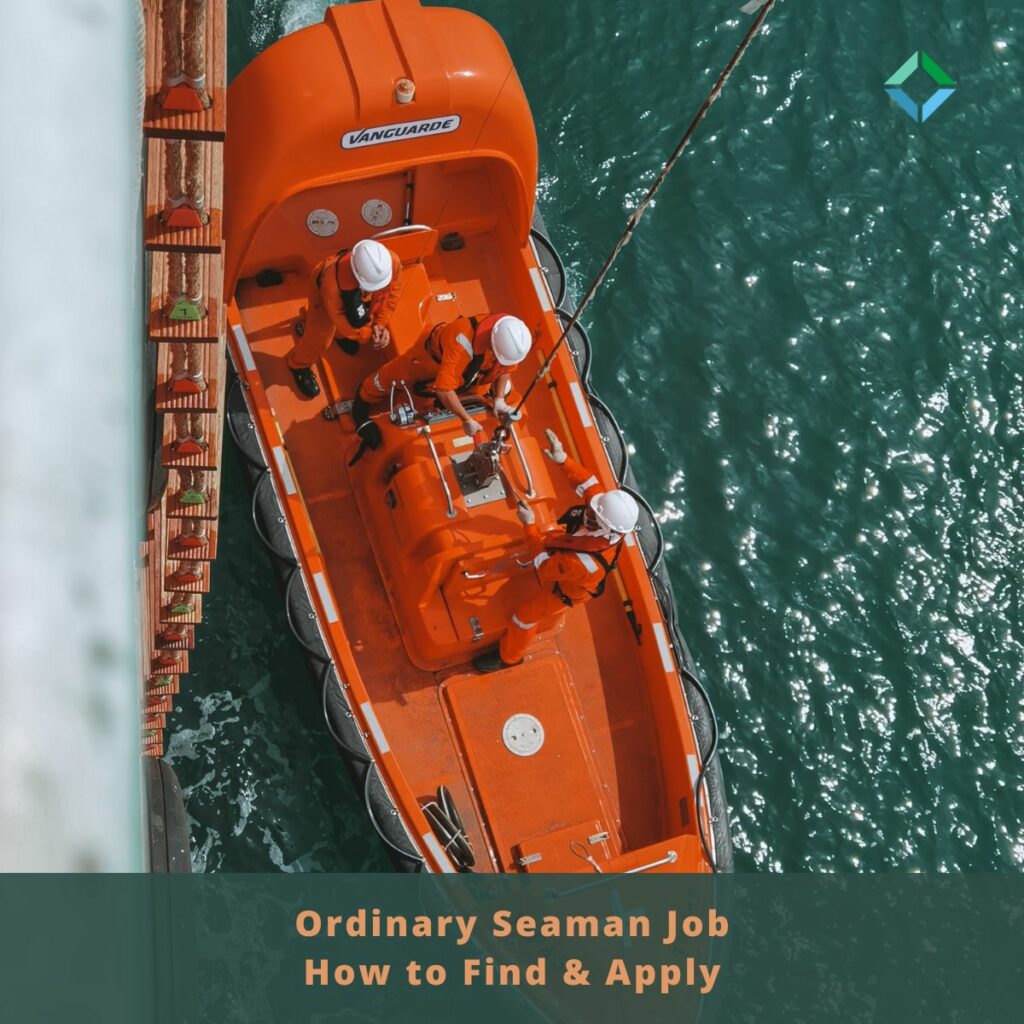Ordinary Seaman Jobs | How to Find One & Apply
One of the entry-level positions in the maritime industry is the Ordinary Seaman (OS) job.
The maritime industry is an essential component of global trade and commerce, and it requires a skilled and experienced workforce to operate efficiently. The industry is diverse and provides many OS job opportunities for seafarers interested in working at sea.
Ordinary Seaman's Responsibilities and Qualifications
An Ordinary Seaman (OS) is an entry-level deck-rating position in the maritime industry. OS positions do not require formal education or prior experience, making it an attractive option for individuals seeking their first sea job. However, it is important to note that OS positions are physically demanding and require a strong work ethic, adaptability, and the ability to work in challenging and sometimes dangerous environments.
An Ordinary Seaman's primary responsibility is to assist the deck crew in maintaining the vessel's cleanliness and orderliness. They are also responsible for handling mooring lines during docking and undocking and assisting in the loading and unloading of cargo. An OS must be physically fit and able to lift and move heavy objects. They must also be comfortable working outdoors and in all weather conditions.
An Ordinary Seaman's qualifications include being at least 18 years old, having a valid passport, and passing a pre-employment medical examination. Additionally, OS candidates must have Basic Safety Training (BST) certification. BST is a mandatory certification for all seafarers and covers basic safety and survival skills, including firefighting, first aid, and personal survival techniques.
In addition to the basic qualifications, an Ordinary Seaman must possess a range of skills to excel in the position. These skills include strong communication skills, the ability to follow instructions, a willingness to learn and work as part of a team, and a positive attitude. Since OS positions often require long periods at sea, candidates must be able to cope with the isolation and confinement that come with life on board a vessel.
Finally, it is important to note that an Ordinary Seaman position is an entry-level position. However, it is also an excellent opportunity to gain experience and advance in the maritime industry. With hard work and dedication, an OS can advance to higher positions, such as Able Seaman or even Officer positions.

Ordinary Seaman Jobs - Skills and Certifications
To become an Ordinary Seaman, certain skills and certifications are required in the maritime industry. An Ordinary Seaman is an entry-level position in the deck department of a ship. They are responsible for carrying out a wide range of duties related to maintenance, operation, and navigation of a vessel.
Here are some of the skills and certifications required to become an Ordinary Seaman:
- Basic Safety Training (BST): BST is a mandatory requirement for all seafarers. It includes four modules: personal survival techniques, fire prevention and firefighting, elementary first aid, and personal safety and social responsibilities.
- Crowd Management: Crowd management is a mandatory certification for seafarers who work on passenger ships. It covers skills related to handling and managing large groups of people in emergency situations.
- Basic Seamanship: Basic seamanship skills include knot-tying, rope handling, and basic navigation. An Ordinary Seaman must have basic seamanship skills to assist in the maintenance and operation of the ship.
- Communication: An Ordinary Seaman must be able to communicate effectively with the rest of the crew and follow instructions.
- Teamwork: An Ordinary Seaman must be able to work well in a team and contribute to the efficient operation of the ship.
- Physical Fitness: An Ordinary Seaman must be physically fit and able to perform duties such as lifting heavy objects and working in challenging weather conditions.
- Navigation: An Ordinary Seaman must have a basic understanding of navigation and be able to assist in maintaining the vessel's charts, logs, and records.
- Safety Procedures: An Ordinary Seaman must be knowledgeable in safety procedures and be able to assist in drills and safety inspections.
In addition to these skills, there are also certifications that are required to become an Ordinary Seaman. These certifications include:
- STCW Certification: STCW stands for the Standards of Training, Certification, and Watchkeeping for Seafarers. It is an internationally recognized certification that covers basic safety training, basic firefighting, and basic first aid.
- Seafarer's Medical Certificate: A medical certificate is required to ensure that seafarers are fit to work and do not have any medical conditions that may affect their performance.
- Passport: A valid passport is required for seafarers to travel internationally.
- Seaman's Book: A seaman's book is a document that verifies a seafarer's identity and employment history. It is required for all seafarers.
How to Find Ordinary Seaman Jobs
Finding Ordinary Seaman jobs can be a daunting task, especially for individuals who are new to the maritime industry. However, with the right resources and strategies, candidates can increase their chances of finding and securing an OS sea job.
One of the most common ways to find Ordinary Seaman jobs is through online job portals such as Veseljoin, Indeed, Monster, and LinkedIn. These platforms have search filters that allow candidates to specify their job preferences, including job location, salary range, and sea job type. Candidates can also upload their resumes and cover letters to increase their visibility to potential employers.
Another option for finding Ordinary Seaman jobs is to visit the websites of shipping companies and check their human resources pages. Many shipping companies post their sea job openings on their websites, and candidates can submit their resumes and cover letters directly through the website.
Maritime labor unions and job placement services can also be a valuable resource for candidates seeking Ordinary Seaman jobs. These organizations specialize in connecting job seekers with potential employers in the maritime industry. Candidates can contact these organizations to inquire about available job openings or to receive assistance with their job search.
Job fairs and networking events are another way to find Ordinary Seaman jobs. These events allow candidates to meet with representatives from shipping companies and learn about available job openings. Candidates can also network with other industry professionals and gain valuable insights into the industry.
Network, Network, Network! Vesseljoin is a social media platform specifically made for seafarers where you can find jobs at sea and other seafarers from all ranks. You can become friends with other seafarers, send them messages, and expand your professional network in order to find easier your first or your next ordinary seaman job.
Finally, candidates can try to directly contact vessel operators to inquire about job openings. This strategy requires research and persistence, as candidates must identify potential employers and reach out to them directly.
How to Apply for Ordinary Seaman Jobs
After finding Ordinary Seaman job openings, candidates must know how to apply for these positions effectively. Applying for an OS position requires attention to detail and a thorough understanding of the application process. Here are some tips on how to apply for Ordinary Seaman jobs.
- Update Your Resume and Cover Letter: Before applying for an OS position, it is essential to update your resume and cover letter. Make sure your resume highlights your qualifications and skills that match the requirements of the job. Your cover letter should be tailored to the job opening and should explain why you are the best fit for the position.
- Follow the Application Instructions: Every job opening has specific application instructions. Make sure to read and follow these instructions carefully. Pay attention to the application deadlines, required documents, and the method of application (online, email, or mail).
- Obtain the Required Certifications: As mentioned earlier, Basic Safety Training (BST) certification is a mandatory requirement for all seafarers. Make sure you have this certification before applying for an Ordinary Seaman position. Other certifications, such as Crowd Management and Security Awareness, may also be required for some positions.
- Prepare for the Interview: After submitting your application, you may be invited for an interview. Make sure to prepare for the interview by researching the company and the position. Practice answering common interview questions and be ready to provide examples of your skills and experiences.
- Be Persistent: The maritime industry is competitive, and finding an OS position may take time. Be persistent and follow up on your applications and interviews. If you don't get the job, ask for feedback and use it to improve your future applications.
Ordinary Seaman Jobs - Tips for a Successful Resume
Creating a successful resume is a critical component of the job search process, including in the maritime industry when looking for Ordinary Seaman jobs. A well-crafted resume can showcase your qualifications and skills and increase your chances of getting hired. Here are some tips on how to create a successful resume for an Ordinary Seaman job.
Tailor Your Resume: Tailor your resume to the specific job you are applying for. Highlight the skills and experiences that match the job requirements, and emphasize your maritime-related experience, if any.
Use Relevant Keywords: Use relevant keywords in your resume that match the job description. This can improve your chances of getting noticed by automated applicant tracking systems that some companies use.
Include Relevant Experience: Include your relevant work experience, even if it is not maritime-related. Highlight your transferable skills that can apply to the maritime industry, such as teamwork, communication, and problem-solving.
Highlight Your Education and Certifications: Highlight your education and any relevant certifications, such as BST and Crowd Management, as these are mandatory requirements for seafarers.
Keep it Concise: Keep your resume concise and easy to read. Use bullet points and short sentences to highlight your achievements and experiences. Avoid lengthy paragraphs and unnecessary details.
Proofread Your Resume: Proofread your resume for spelling and grammar errors. Ask a friend or family member to review your resume and provide feedback.
Include a Professional Summary: Including a professional summary at the beginning of your resume can provide a brief overview of your skills and experiences and grab the employer's attention.
Customize Your Format: Customize the format of your resume to make it easy to read and visually appealing. Use a font size and style that is easy to read and avoid using too many colors or graphics.






